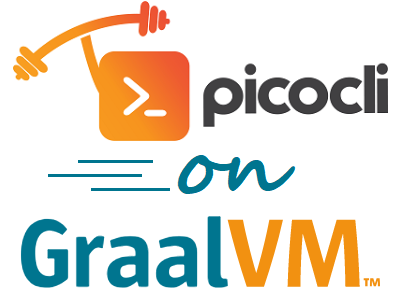
GraalVM
GraalVM allows you to compile your programs ahead-of-time into a native executable. The resulting program has faster startup time and lower runtime memory overhead compared to a Java VM. This is especially useful for command line utilities, which are often short-lived.
GraalVM has limited support for Java reflection and it needs to know ahead of time the reflectively accessed program elements.
Reflective Access
Picocli currently uses reflection to discover
classes and methods
annotated with @Command, and fields,
methods or
method parameters annotated with @Option and @Parameters and other picocli annotations. A future picocli release may include an annotation processor to do this work at compile time, but as it stands, it uses reflection.
ReflectionConfigGenerator Tool
Picocli 3.7.0 includes a picocli-codegen module, with a tool that generates a GraalVM configuration file.
ReflectionConfigGenerator generates a JSON String with the program elements that will be accessed reflectively in a picocli-based application, in order to compile this application ahead-of-time into a native executable with GraalVM.
The output of ReflectionConfigGenerator is intended to be passed to the -H:ReflectionConfigurationFiles=/path/to/reflectconfig option of the native-image GraalVM utility. This allows picocli-based applications to be compiled to a native image.
Example Usage
We will use the picocli.codegen.aot.graalvm.Example class that is in the tests for the picocli-codegen module as an example. First, we will generate a reflect.json configuration file with the ReflectionConfigGenerator tool. Next, we will compile the Example class to a native application, and finally we will run this application and see what the difference is in startup time between the native application and running on Hotspot.
Generating the Configuration File
Run the ReflectionConfigGenerator tool and specify one or more fully qualified class names of the @Command-annotated classes. The output is printed to System.out, so you will want to redirect it to a file:
java -cp \
picocli-3.7.0.jar:picocli-codegen-3.7.0-tests.jar:picocli-codegen-3.7.0.jar \
picocli.codegen.aot.graalvm.ReflectionConfigGenerator picocli.codegen.aot.graalvm.Example > reflect.jsonThe generated reflect.json files looks something like this:
[
{
"name" : "picocli.codegen.aot.graalvm.Example",
"allDeclaredConstructors" : true,
"allPublicConstructors" : true,
"allDeclaredMethods" : true,
"allPublicMethods" : true,
"fields" : [
{ "name" : "spec" },
{ "name" : "unmatched" },
{ "name" : "timeUnit" },
{ "name" : "file" }
],
"methods" : [
{ "name" : "setMinimum", "parameterTypes" : ["int"] },
{ "name" : "setOtherFiles", "parameterTypes" : ["[Ljava.io.File;"] },
{ "name" : "multiply", "parameterTypes" : ["int", "int"] }
]
},
...
]|
Tip
|
If necessary, it is possible to exclude classes with system property picocli.codegen.excludes, which accepts a comma-separated list of regular expressions of the fully qualified class names that should not be included in the resulting JSON String.
|
Compiling a Native Image
This assumes you have GraalVM installed, with prerequisites. From the site:
To build a native image of the program use the
native-imageutility located in thebindirectory of the GraalVM distribution. For compilationnative-imagedepends on the local toolchain, so please make sure:glibc-devel,zlib-devel(header files for the C library andzlib) andgccare available on your system.
I also needed the static packages glibc-static and zlib-static, other than the devel packages.
We compile the example class with the following command:
graalvm-ce-1.0.0-rc6/bin/native-image \
-cp picocli-3.7.0.jar:picocli-codegen-3.7.0-tests.jar \
-H:ReflectionConfigurationFiles=reflect.json -H:+ReportUnsupportedElementsAtRuntime \
--static --no-server picocli.codegen.aot.graalvm.ExampleThe reflect.json is in the current directory, and I added -H:+ReportUnsupportedElementsAtRuntime to get a useful error message in case something goes wrong.
|
Tip
|
native-image --expert-options shows a list of other compilation options not shown in the output of native-image --help.
|
Running the Native Image
If compilation went well, we now have a native executable picocli.codegen.aot.graalvm.example in the current directory:
$ ls -alh picocli*
-rwxrwxr-x 1 remko remko 15M Oct 4 21:35 picocli.codegen.aot.graalvm.exampleThe name of the executable is derived from the main class name. If the jar is an executable jar (with the Main-Class specified in the manifest), we could have run native-image [options] -jar jarfile to build an image for the jar file.
Let’s first run the application in Java, and time it to see how long it takes to start up.
$ time java -cp picocli-3.7.0.jar:picocli-codegen-3.7.0-tests.jar \
picocli.codegen.aot.graalvm.Example --version
3.7.0
real 0m0.492s
user 0m0.847s
sys 0m0.070sOn Java Hotspot, it takes about half a second to run. Now, we run the native image:
$ time ./picocli.codegen.aot.graalvm.example --version
3.7.0
real 0m0.003s
user 0m0.000s
sys 0m0.004sThe startup time is now down to 3 milliseconds!
All command line parsing functionality works as expected, with type conversion, validation and help with ANSI colors. This is exciting news when you want to write command line applications and services in Java and have them run instantaneously.
Conclusion
GraalVM is an exciting new technology that allows Java programs to run as native code. This gives reduced memory usage and startup time, which is especially useful for short-running programs like command line utilities.
The ReflectionConfigGenerator tool included in the picocli-codegen module allows picocli-based applications to be compiled to native executables with extremely fast startup times.
Please star ☆ GraalVM and picocli on GitHub if you like the projects!